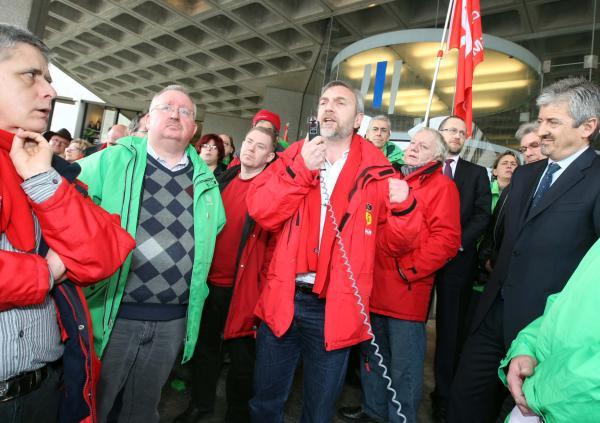
On 29 February 2012 trade unions from Belgium, France and Luxembourg visited the EIB at its Luxembourg headquarters on the European Trade Union Confederation’s European day of action.
The CSC, FGTB (Belgium), CFDT, CGT (France) and LCGB, OGBL (Luxembourg) delegations appealed to the EIB’s top officials for a positive, social Europe – a Europe of investment “as opposed to a Europe of austerity and decline”. EIB Secretary General Alfonso Querejeta stated that the Bank’s priority was to support growth and job creation and that 90% of its loans were earmarked for projects within the European Union. He set out briefly the EIB's strategies and the scope of its activities.
The Bank’s operations in 2012 and the coming years will for the most part continue to focus on growth and jobs in the EU in accordance with the decisions and policies of the European Council. The EIB is the European Union’s project financing bank.
In 2011, the Bank signed new loans totalling EUR 54bn for projects within the EU and EUR 60bn was disbursed to provide unprecedented financial backing to the real economy, thereby supporting almost all sectors of activity.
The EIB has made SMEs and micro-enterprises a priority as they are especially vulnerable at times of economic crisis: in 2011 the EIB Group provided a record amount of EUR 13bn for this sector, which benefited 120 000 European SMEs.
The EIB intends to help SMEs even more in 2012 despite the fact that the Bank’s overall lending is set to gradually return to pre-2008 levels as part of a strategy aimed at preserving the institution’s financial strength.
In 2012 the EIB will continue to provide some EUR 50bn to promote both growth and job creation. It will use its financing capacity and operational capabilities to the full by combining its loans with EU grant aid in order to leverage support for investment. It will also develop its technical advisory services to prepare sound, viable projects that will drive growth in all EU countries.